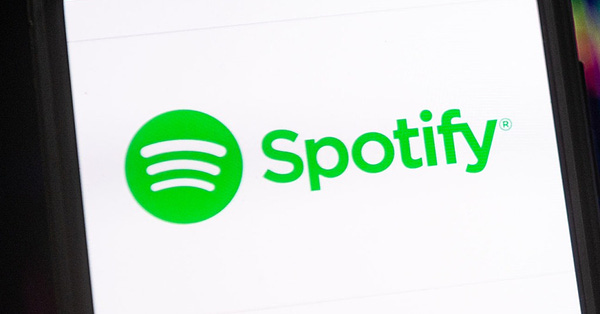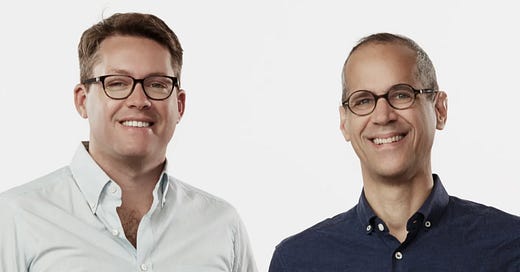An Oral History of Gimlet's Slow Demise
Plus: MPR Union Employees Are Fighting to Keep Overtime Pay


Just as I hit send on last week’s issue of this newsletter, Spotify announced the cancelation of eleven podcasts as well as layoffs at two of the studios the streaming giant acquired in 2019, Gimlet and Parcast. Since then, I’ve interviewed five current and former Gimlet staffers, all of whom requested anonymity for fear of retaliation. With their help, I’ve put together a sort of “oral history” of Gimlet’s slow demise at Spotify. It’s disheartening, but important.
Before we jump in, everyone should also know that management at MPR, APM, and Marketplace is trying to do away with overtime for most Marketplace union members. Everything about this sucks and to make matters worse, MPR is being represented in the negotiations by Jones Day, a law firm that’s tight with Donald Trump, and has represented tobacco, opioid, gun and oil companies. Sweet!
Moving on —
“Well, Spotify said themselves this morning on the earnings call that they have no intention of taking the shows that are out there that Gimlet produces and putting them behind a paywall.”
— Alex Blumberg, during an interview with Recode Media’s Peter Kafka on February 7th, 2019
An Oral History of Gimlet’s Slow Demise at Spotify
Please note: This piece blends the stories of multiple anonymous sources and has been edited for clarity and length. This piece does not cover what happened to the Reply All podcast, as that has already been widely documented.
We were told that Spotify loved what we were doing; nothing would change. We would have more resources at our disposal to tell the stories we were already telling. Management kept saying that this was going to be amazing for everyone.
Things were a bit different behind the scenes. For example, Gimlet had to get the hosts to sign new contracts so that Spotify could be sure that they wouldn’t walk out the door. From what I heard, the hosts were given two days to sign. Gimlet management told them that if they didn’t sign their contracts — or if they made any changes at all — it would jeopardize everything. They were basically forced.
The day the deal closed was dramatic. After they announced the news, the whole company got on a bus and went to a private concert where we had cocktails with some of Spotify execs at their office in Chelsea.
At first, the Spotify people said they were open to our ideas, but that really didn’t turn out to be true. It very quickly went from brainstorming all the new, creative things we wanted to do to this new reality where we had to get permission from Spotify every time we had an idea.
Then we started getting requests from on high — it would be like, we want to increase the number of Spotify listeners on your show, so we need you to make some bonus content, okay? It had a huge impact on our production. It was obvious that they didn’t really understand how making podcasts worked or what our relationship with our audience was like at all.
Those requests escalated and eventually they made pretty much all the shows go exclusive, which Gimlet management had promised would never happen. That’s when I really knew we had a problem.
It was never clear who the requests were coming from or how to respond to them. There were no channels where we could interact with people at Spotify. Gimlet management suggested we ask questions at these Spotify “town halls” or post on Workplace, which is like Spotify’s social network for work. So I’d submit questions at town halls and I’d post on their dumb Facebook thing but no one ever answered me.
After all the exclusivity requests came down, the Joe Rogan stuff happened. As a result, people were boycotting Spotify — fairly, in my opinion — but of course, now they’re not listening to our show either.
The metrics for measuring our shows changed as well. As a creator, we want our work to be listened to by as many people as possible. But instead of being measured against reach, we were now being measured against something called “play day one.” That’s a metric where Spotify tracks how often a user is hitting play on your show as one of the first things they do on the platform.
So instead of growing your audience on Spotify, you’re now supposed to extract value out of your audience for Spotify. There was also no budget for promoting your show, aside from promotion within the Spotify platform. They were not going to pour money into promoting your show anywhere else.
Meanwhile, every week Spotify was heavily promoting these big-name, headline-grabbing shows, or their deals with celebrities. Interestingly, some of those personality-driven shows didn’t do very well. The Obama-Springstein podcast did terribly. It was a total dud.
Before Spotify acquired us, our little journalistic podcasts had done pretty well. We had an amazing sales team at Gimlet Creative; they sold the shit out of our shows and we had some of the highest CPMs in the industry — across the board, on all of our shows.
Back then, Every Little Thing’s inventory was always sold out. It made money consistently. It didn’t grow like gangbusters, but it was profitable. And Spotify just canceled it with no notice, after seven years or whatever. (Editor’s note: according to the Internet, ELT launched in 2017.]
Last week was awful. I found out because people were posting [on a Slack channel for Gimlet union members] that they were seeing meetings with Spotify HR pop up on their schedule. They would go to these meetings and different HR reps — people who had never even met our teams before — would tell them that their show had been canceled. After that, everyone got funneled into one-on-one meetings to find out if they still had a job.
When Spotify canceled The Get Up a few months ago, HR told the union rep ahead of time and the team got two week’s notice. This time the layoffs were effective immediately and the rep had no idea it was happening. Teams were in the middle of producing stories; some were publishing episodes that day. The HR people didn’t seem to understand that these were journalists who needed to let sources know that their work was being shut down.
It’s crazy to think that what we feared in those early days of the acquisition is actually playing out right now. I think that one thing that could help make things right is if Spotify created some kind of path forward for the hosts who want to take their shows somewhere else. I’m pretty sure they did that with The Pitch, so there might be a precedent for it. [Editor’s note: this is accurate; you can read about that deal here.]
We're supposed to have an all-hands meeting tomorrow. I’d like to think that that they’ll have something reassuring to say, but I feel like Spotify just doesn’t want to deal with us anymore. They’re probably like “why do we own this company?”
In the days of [early Gimlet podcast] Startup, it felt so exciting, like we were making this thing together and everyone just wanted to make great stuff. That’s been eroded. We're now in the hands of a company that doesn't understand what we do and doesn’t care about anything we're making.
Matt’s gone and I am fairly certain he left money on the table. Alex basically just stopped leading the company after the acquisition — even more so when Lydia [Polgreen, the former managing director at Gimlet Media] came onboard. At that point, he was like, I’m out. Matt and Alex could definitely see what was happening, but if they had shared their true feelings about it, I think it just would have made things worse.
I would estimate that five to ten percent of the people who came to Spotify from Gimlet are still engaged, at least from a work standpoint. They’re the ones who have been able to navigate the politics, get on the right teams, get promotions. But the vast majority of people are just vesting their stock and figuring out the next thing to do.
A final note from Skye:
Yesterday, I received an update from a current Gimlet employee who attended an “all-hands” Gimlet meeting this past Tuesday. According to the source, during the meeting, a Spotify HR rep and head of Spotify U.S. Studios Julie McNamara told employees that the shows “were canceled because they weren’t successful but said there was no specific number they were using as a metric of success.” When an employee asked what success would look like going forward, they didn’t seem to have an answer, simply responding with the words “great question.” While McNamara said that she didn’t anticipate more layoffs, the HR rep added that neither of them couldn’t make any guarantees.
That’s all for me this week! See you in two weeks.
Skye





Skye,
This is super interesting. Clearly employee discontent is top of mind for large orgs. But as you explore these issues further with the PRX employees (and ex employees?), I wonder if you can ask them about what they think would be the solutions to the org's problem. One person here is hinting that a leadership change is necessary. That's not always the fix we think it'll be. It's certainly not a quick fix for deep-rooted cultural problems that are described here. So I wonder what else could PRX do but hire, promote, and green-light more shows from BIPOC creators? Do these employees feel that isn't enough of a demonstration of valuing them and their ideas? I'm very much interested in the management-employee dynamic and where expectations are.
Skye,
This is great stuff. I would love it in an audio format that wasn't the subsctack robot.